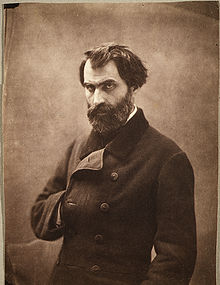Eugène Pelletan

Pierre Clément Eugène Pelletan (born October 29, 1813 in Saint-Palais-sur-Mer , † December 13, 1884 in Paris ) was a French writer, publicist and politician.
Life
Pierre Clément Eugène Pelletan studied law in Paris from 1833, then philosophy and literature, and then worked for many years as a critic in the press and the Revue des Deux Mondes . He gained a reputation for his criticism and polemics, which were free from all clerical influences. In 1848 he founded the Bien public with Alphonse de Lamartine and fought against the Second Empire in the Siècle and Courrier du dimanche . In 1863 and 1869 he was elected to the Legislative Body as a member of the left opposition. After September 4, 1870, he was a member of the government of national defense and during the siege of Paris he was in particular in charge of the ambulances. From 1871–76 he was a member of the Republican Left in the National Assembly . From 1876 he was a member of the Senate , whose vice-president he became in January 1879. Elected Senator for life in June 1884, he died on December 13 of the same year at the age of 71 in Paris. His son Charles Camille Pelletan (born June 28, 1846, † June 4, 1915) was also a French politician and journalist.
Works (selection)
- La lampe éteinte . 2 volumes, 1840
- L'histoire du brahmanisme . 1846
- Heures you travail . 2 volumes, 1854, 2nd edition 1869
- Le pasteur du desert . 1855 (biography of Pelletan's grandfather)
- La loi de progrès . 1857, 6th edition 1881
- Les droits de l'homme . 1858, 2nd edition 1867; German, Bremen 1870
- Décadence de la monarchie française . 1860, 4th edition 1872
- La nouvelle babylone . 1863; German, Bremen 1871
- Les fètes d'intelligence . 1863
- La charte du foyer . 1864
- New heures de travail . 1870
- Elisée; voyage d'un homme à la recherche de lui-même . 1877
- Dieu est-il mort? 1883
literature
- Pelletan, Pierre Clément Eugène . In: Meyers Konversations-Lexikon . 4th edition. Volume 12, Verlag des Bibliographisches Institut, Leipzig / Vienna 1885–1892, p. 814.
| personal data | |
|---|---|
| SURNAME | Pelletan, Eugène |
| ALTERNATIVE NAMES | Pelletan, Pierre Clément Eugène (full name) |
| BRIEF DESCRIPTION | French writer, publicist and politician |
| DATE OF BIRTH | October 29, 1813 |
| PLACE OF BIRTH | Saint-Palais-sur-Mer |
| DATE OF DEATH | December 13, 1884 |
| Place of death | Paris |